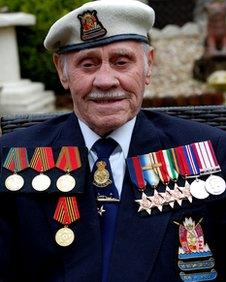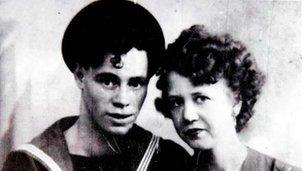Arctic convoy veteran Herbert MacNeil hopes for recognition
- Published

Herbert MacNeil has been honoured four times by the Russians
For the Arctic convoys of World War II that took supplies to the Soviet Union - braving 70ft (21m) waves and temperatures as low as -50C - the weather and seas were just as deadly as the U-boats.
"I was more scared of the weather than the enemy," said 86-year-old veteran Herbert MacNeil, from Manchester.
Yet most of the medals adorning Mr MacNeil's crisp blue blazer as he stands at the Middleton war memorial on Remembrance Day have been awarded by the former USSR and the Russian Federation.
He has been honoured four times by the Russians in 1985, 1995, 2005 and 2010.
Winston Churchill said the convoys carried out "the most dangerous journey in the world".
Yet veterans believe they have received scant recognition from the British government for their sacrifices and the enormous risks they ran.
Chipping ice
The Arctic sailors received the same medal as those who served on the Atlantic convoys.
"The Arctic was totally different to the Atlantic - somebody needs to tell them in Whitehall," said Mr MacNeil.
"They gave us an Atlantic medal it was like giving us something from a corn flake packet."
Mr MacNeil, who joined the Royal Navy in 1941 age 16, served as an anti-aircraft gunner but a lot of his time was spent battling the elements.
"If you didn't shift the ice the ship could capsize, it was in danger of overturning," he said. "We had to try and chip it off with hammers and scrapers - anything you could lay your hands on.
"They were terrible conditions. You daren't touch any metal rail on deck as your hand would stick to it.
"When the bows [of the ship] went into a wave you thought they were never going to come out again, you would breathe a sigh of relief and say that's it until the next comes. It was shocking, you did four hours on deck unless it was action stations."
Frozen clothes
He added: "When you got down below, it was mayhem. All the asbestos had come off the deck heads - the floors were swamped, everything was wet.
"You had no dry clothing and hoped the first lot you had worn had dried out but it never did it stayed wet all the time. You daren't go on the upper deck as it would have frozen to you."
Prime Minister David Cameron told MPs at Prime Minister's Questions on Wednesday he had "every sympathy" with the case of the Arctic convoy veterans.

Herbert MacNeil was 16 when he joined up
He said a review would look at the general issue of medals, with the Arctic convoys "probably the most pressing".
Mr MacNeil and other veterans believe the Cold War was responsible for their lack of recognition.
"It was a political thing because of the Cold War. We were all for the Russians during the war," he said.
The unspoken hope is that the honour will not be posthumous for those surviving vets.
He added: "It's about time them at the top took their fingers out and did what was right and give us what we're due.
"All it needs is somebody with a bit of common sense to say the Russians have recognised their men it's time for us to recognise our men.
"It would be thanks for a job well done."
- Published31 October 2012
- Published15 May 2012